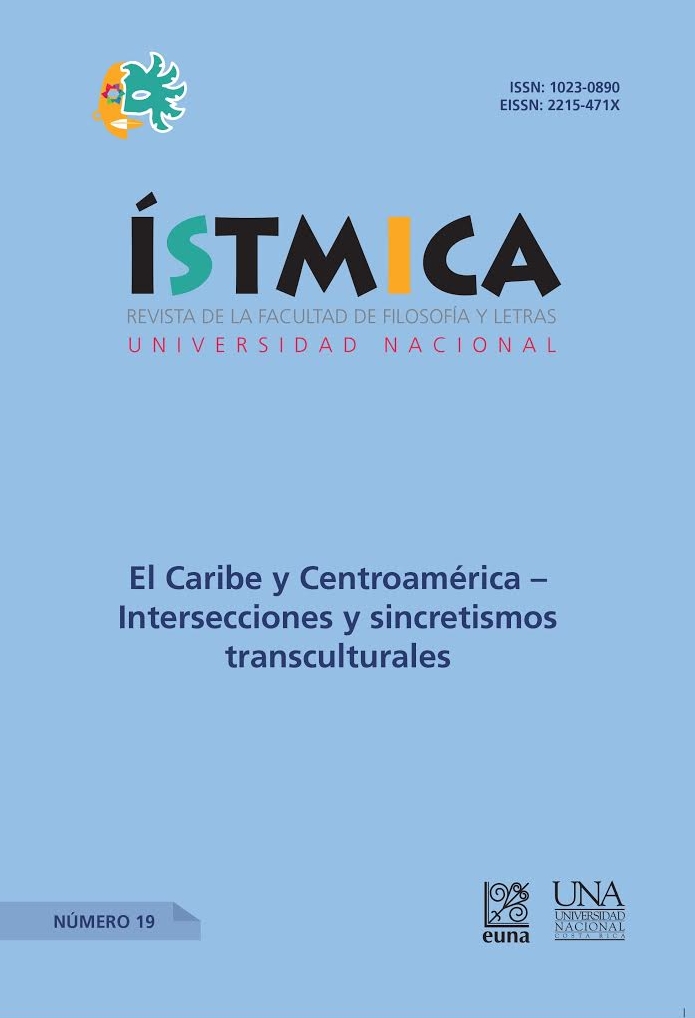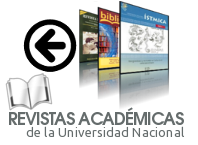De solidaridades problemáticas y utopías sin armonizar: una lectura de Limón Reggae (2007), de Anacristina Rossi, y Big Banana (2000), de Roberto Quesada
DOI:
https://doi.org/10.15359/istmica.19.13Keywords:
migration, African descent, coexistence, community identity.Abstract
This article analyzes the limits of solidarity based on the decentering of the mestizo protagonists in Limón Reggae by Costa Rican writer Anacristina Rossi (2007), which portrays the Costa Rican descendants of immigrants from the Antilles (primarily from Jamaica), and Big Banana by Honduran author Roberto Quesada (2000), which describes the Garifuna people from Honduras. While Limón Reggae explores a solidarity that is both political and structural in nature in both Costa Rica and the United States as well as the possibility of interracial romantic relationships, Big Banana focuses on empathetic solidarity through the relationship between Eduardo and Mairena on American soil, thus problematizing the possibility of reinventing one’s identity in this “third space.” In short, neither text dares offer a simplistic and/or homogenous solution for coexistence and so both groups finally remain separate. There is no ambition to reorient the inferior experience or even the experience of “the other.” Moreover, both emphasize the place of proclamation and in that way avoid falling into the fallacy of fictional solidarities that are lost in their own fantasy of solidarity for not listening to “the other”.
References
Amason Montero, E. (2010). The Construction of Blackness in Honduran Cultural Production (Dissertation). The University of New Mexico, Albuquerque, New Mexico.
Bhabha, H. K. (1994). The Location of Culture. New York: Routledge.
Bourgeois, P. I. (1994). Banano, etnia y lucha social en Centro América (1st ed.) San José, Costa Rica: Editorial Departamento Ecuménico de Investigaciones (DEI).
Gargallo, F. (2012). Garífuna, garínagu, caribe. Historia de una nación libertaria. Ciudad de México: Edición digital de la autora. Retrieved from http://fracescagargallo.wordpress.com/ensayos/librosdefg/garifuna-garinagu-caribe/
Hernández Cruz, O. (S.F) De inmigrantes a ciudadanos: hacia un espacio político afrocostarricense, 1949-1998. Revista de Historia, (39), 207–249.
Hooker, J. (2009). Race and the politics of solidarity. Transgressing boundaries Oxford, New York: Oxford University Press.
Kanellos, N., & Hernández, L. (2002). Lucas Guevara: la primera novela de inmigración hispana a los Estados Unidos. Hispania, 85(4), 795–803.
Marchio, J. (2010). Literatura de las fronteras y fronteras de la literatura: representación de los conflictos lingüísticos de la costa caribeña en la literatura costarricense. Istmo: Revista Virtual de Estudios Literarios y Culturales Centroamericanos, (21). Retrieved from http://istmo.denison.edu/n21/articulos/6.html
Mosby, D. E. (2003). Place, language, and identity in Afro-Costa Rican literature. Columbia: University of Missouri Press.
Quesada, R. (2001). Big Banana. Barcelona: Seix Barral.
Rodríguez Chavarría, S. (2007). Limón Blues de Ana Cristina Rossi. La negación del sujeto subalterno. Revista Pensamiento actual. Universidad de Costa Rica, 7(8-9), 78–83.
Rodríguez, A. P. (2009). Dividing the Isthmus: Central American transnational histories, literatures, and cultures (1st). Austin: University of Texas Press. Retrieved from http://www.worldcat.org/oclc/259716059
Rossi, A. (2007). Limón Reggae (2a). San José: Editorial Legado.
Spinner-Halev, J. (2008). Democracy, Solidarity and Post-nationalism. PoliticalStudies, 56(3), 604–628 . doi:10.1111/j.14679248.2007.00708.x
Downloads
Published
How to Cite
Issue
Section
License
Las personas autoras que publiquen en esta revista permiten cesión gratuita, exclusiva, de ámbito mundial de sus derechos de autoría a la Universidad Nacional (Costa Rica), conservando únicamente sus derechos morales sobre la obra publicada.
Los artículos pueden ser citados y copiados, citando a la persona autora y la fuente. Todos los artículos publicados en la Revista Ístmica están protegidos bajo una Licencia Creative Commons Atribución-NoComercial-CompartirIgual 4.0 Internacional








